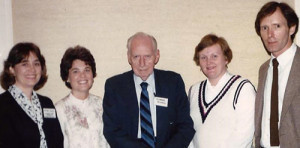In summer of 1977, along the shore of Lake Michigan, in Evanston and Wilmette, Illinois, a few clinical social workers began gathering informally in each other’s homes to learn about Bowen family systems theory. Some of those in attendance were, at that time, in the Special Post-graduate Training Program led by Dr. Murray Bowen at the Georgetown Family Center (now renamed The Bowen Center). All were curious about Bowen theory, family of origin research, and family systems therapy. To meet requests of others curious about the theory, this association of independent practitioners began setting up family of origin programs and Bowen theory conferences. In 1979, the members named their endeavor Center for Family Consultation (CFC).

Left to right: Sydney Reed, Carol Moran, Dr. Murray Bowen, Stephanie Ferrera and Robert Noone
From 1984-1990 Dr. Bowen participated in the annual Spring Midwest symposium and CFC training program.
For nearly thirty years, Stephanie Ferrera, Carol Moran, Robert Noone and Sydney Reed were the faculty of CFC. In 2007, the faculty was expanded and now includes John Bell, Leslie Fox, Cecilia Guzman, Lisa Moss, Kelly Matthews-Pluta, Robert Williamson, and Patty T. Sheridan. Currently, the professions of social work, business, and ministry are represented in the CFC faculty, thus broadening the scope of research and theory application opportunities to human communities beyond the family.
Over the years CFC faculty members deepened their knowledge of both Bowen theory and the natural sciences, especially neuroscience and evolutionary biology. This intellectual connection with the natural sciences is essential for Bowen theory researchers in order to understand the biological underpinnings of human behavior, and to insure that Bowen theory remains fact based. Through presentations and informational exchanges at natural science conferences, as well as the publication of faculty research, CFC faculty members have contributed to the understanding and application of Bowen theory.
Each faculty member’s intellectual journey begins, and continues, in his or her own family of origin research, and in the application of theory to his or her own life. It is broadened by thinking about the challenges found in one’s profession, whether time is spent consulting with clinical clients, or with leaders in business, ministry or public agencies. And the intellectual journey is quickened as Bowen theory informs one’s reading of the life sciences.

